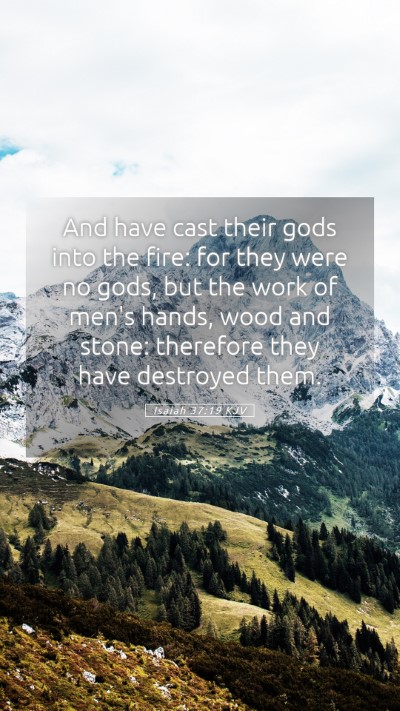Understanding Isaiah 37:19: A Comprehensive Bible Verse Commentary
Isaiah 37:19 states: "And have cast their gods into the fire; for they were no gods, but the work of men's hands, wood and stone: therefore they have destroyed them." This verse speaks to the futility of idolatry and the power of the true God over false gods. Below, we provide a detailed analysis of this verse, synthesizing insights from notable public domain commentaries.
Context of Isaiah 37
To fully grasp the meaning of Isaiah 37:19, it is essential to consider its historical context. This chapter describes God's deliverance of Jerusalem from the Assyrian king Sennacherib's attack. The situation was dire, and the people of Judah faced both fear and uncertainty. Through the prophet Isaiah, God reassured His people, demonstrating His sovereignty and power.
Verse Analysis
-
Idolatry Exposed
Isaiah 37:19 highlights the futility of idol worship. Commentaries like that of Matthew Henry suggest that the "gods" of the Assyrians were mere man-made creations. In ancient cultures, it was common to worship objects of stone and wood, but these had no divine power. This verse serves as a reminder that anything not anchored in the true God is ultimately powerless.
-
God's Authority
Furthermore, Albert Barnes emphasizes that God's authority supersedes any fabricated deity. The destruction of these idols symbolizes God's victory over falsehood and deception. This is archaeologically and culturally significant, as the Assyrians were known for their polytheism and reliance on various deities.
-
The Nature of Worship
Adam Clarke notes that the verse underscores the importance of worshipping the true God. The act of casting idols into the fire is an act of judgment, reflecting the inevitable consequence of idolatry. It serves as a warning to believers about the dangers of misplaced worship and the significance of aligning with God's truth.
Theological Implications
The theological implications of Isaiah 37:19 extend beyond mere commentary. Believers today can seek insights into the nature of idolatry and how they may still encounter figurative "idols" in their lives—anything that stands in the way of their relationship with God. This verse encourages a substantive examination of what occupies the hearts of individuals, pushing them towards genuine devotion.
Application in Daily Life
Understanding Scripture involves applying its teachings to daily life. Isaiah 37:19 invites each individual to reflect on modern-day idolatry. In a world filled with distractions—be it materialism, success, or relationships—this verse serves as a call to evaluate what truly deserves one's loyalty and worship.
Related Biblical Cross References
- Exodus 20:3-5: The command against idolatry, emphasizing the exclusivity of worshipping God.
- Psalms 96:5: "For all the gods of the nations are idols: but the Lord made the heavens." This parallel reinforces the notion of God's supremacy over all false deities.
- Isaiah 40:18: "To whom then will you liken God? or what likeness will you compare unto him?" This illustrates the uniqueness of God compared to idols.
Conclusion
In summarizing the meaning of Isaiah 37:19, we arrive at a multifaceted understanding that spans historical context, theological depths, and practical applications. Whether for personal growth or as part of a Bible study group, this verse serves as a vital reminder of the importance of worshiping the one true God. It invites believers to engage deeper in their Bible study insights, reflect on their faith, and ensure that their worship is directed toward God alone.
The analysis provided combines various perspectives on this verse, encouraging a comprehensive understanding that enriches one's Bible study experience. By utilizing this commentary, learners can explore further into the facets of biblical exegesis and gain insights that are valuable for both personal and communal study settings.


